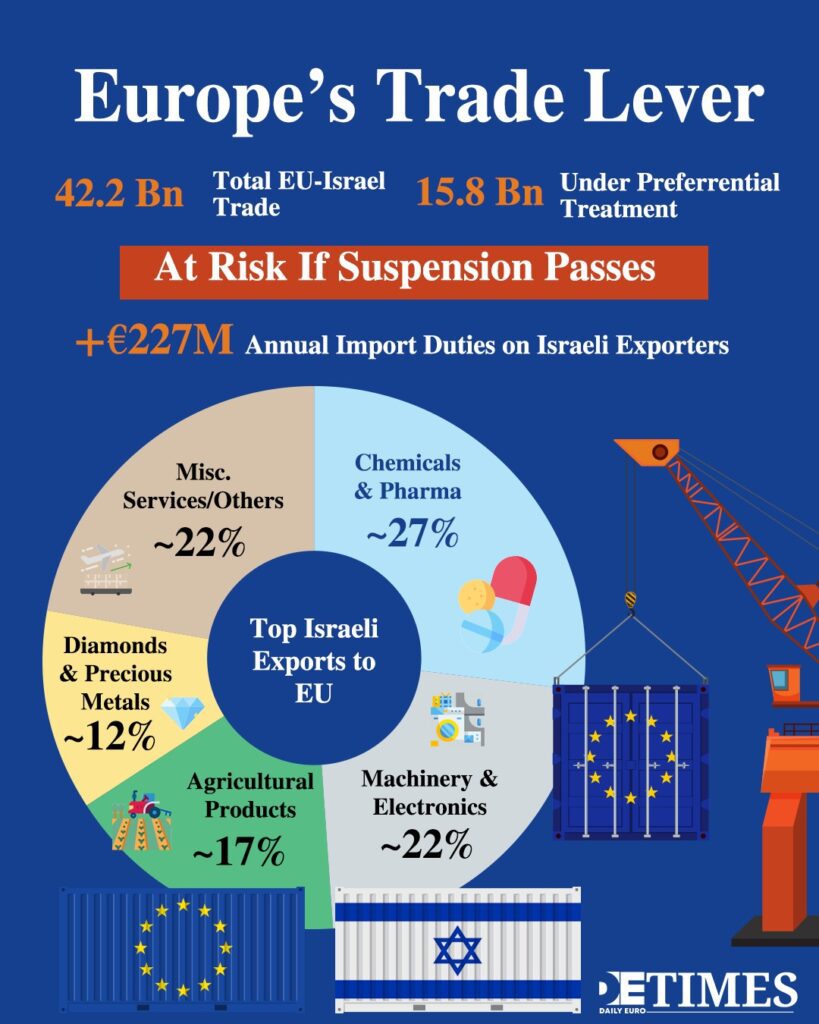The European Commission proposed suspending trade concessions with Israel on Tuesday.
Simultaneously, Emirati academic Abdulkhaleq Abdulla suggested the United Arab Emirates could "freeze" the Abraham Accords.
These coordinated pressures from Brussels and Abu Dhabi reveal tactical manoeuvring rather than fundamental strategic realignment.
Brussels Bites Where It Can
The Commission’s proposal targets €42.6 billion in bilateral trade.
President Ursula von der Leyen confirmed preferential treatment covers 37% of this commerce. Israeli exporters would consequently face an additional €227 million in import duties.
The mathematics matter less than the messaging. Europe lacks military assets in the Levant or security partnerships with Tel Aviv. Trade remains Brussels’ primary lever of influence.
The Commission calculated correctly that economic pressure generates headlines whilst avoiding military entanglements.
Gulf Calculations
In contrast, the Emirates operates from different premises entirely.
Abu Dhabi maintains substantial security cooperation with Israeli intelligence services. Commercial partnerships between Emirati and Israeli firms generated billions in trade since 2020. Direct flights connect Dubai and Tel Aviv multiple times daily.
Nevertheless, Abdulla’s comments occurred as Israel targeted Gaza City. The timing suggests coordination rather than spontaneous academic analysis. Yet freezing differs fundamentally from termination. The Emirates preserves maximum flexibility through deliberate ambiguity.

Economic Interests Drive Politics
Building on these commercial foundations, European firms invested heavily in Israeli technology sectors over decades.
However, the Commission’s proposal requires member state approval which currently lacks sufficient support. Germany and several Central European states oppose trade sanctions on principle. Spain and Ireland requested the suspension in February 2024.
Similarly, Gulf Cooperation Council members pursued normalisation for strategic reasons beyond Israeli relations. The Abraham Accords facilitated American security guarantees and advanced weapons sales. Economic diversification programmes benefit from Israeli technological expertise.
Different Tools for Different Goals
These divergent interests explain why the European Union operates primarily through regulatory frameworks and market access. Brussels cannot offer military protection or intelligence cooperation to regional partners.
By comparison, Gulf states maintain direct security relationships with Israeli counterparts. Abu Dhabi balances regional stability concerns with domestic public opinion.
Tactical Pressure or Strategic Drift?
Given these constraints, neither Brussels nor Abu Dhabi intends permanent rupture with Israeli partnerships.
Rather, the Commission’s proposal demonstrates responsiveness to constituent pressure whilst maintaining diplomatic channels. Gulf academic commentary provides public cover for private diplomatic pressure.
Former Israeli ambassador Amir Hayek warned stakeholders must act wisely to protect regional agreements. His concerns reflect establishment anxiety rather than imminent collapse.
Ultimately, the Abraham Accords survived nearly two years of conflict in Gaza. European trade relationships weathered similar tensions for decades.
Both sides employ economic tools to achieve political objectives. Pressure remains tactical rather than terminal.
Keep up with Daily Euro Times for more updates!
Read also:
European Recognition: The Abraham Accords Lose Their Silver Lining
Qatar Attack Pushes Gulf States Toward European Security
Türkiye Challenges Israel’s Iron Dome Supremacy






